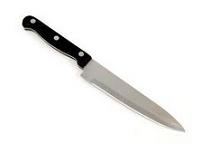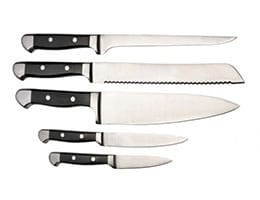 The Latin word cultellus came to our language as a knife . The term refers to a utensil used for cutting , composed of a handle and a sharp metal blade.
The Latin word cultellus came to our language as a knife . The term refers to a utensil used for cutting , composed of a handle and a sharp metal blade.
Generally the knife has a single sharp edge , which can be smooth or serrated. Depending on the use for which it will be intended, this instrument can end in a point or not, and have a straight or curved shape.
For example: "I have the fork but I'm missing the knife: could you give me one?" , "Before preparing the meat, I'm going to sharpen the knife," "With the help of a knife, the man managed to cut the rope and escape."
The handle of the knife can be made from wood, plastic , bones or other materials. The blade, for its part, is made of stainless steel, ceramic or plastic. There are knives that, due to their characteristics, are considered disposable: they can be used once and then lose their usefulness.
In the kitchen, you can differentiate between the table knife , the butter knife , the bread knife and others. Knives are not only used to cut food : they are also used to remove inedible parts (fat, bones, peels, etc.).
Various trades and professions require the use of these tools . Carpenters, electricians, surgeons and barbers, to name a few, use knives in their daily work.
It should be noted that knives, finally, are often used as a weapon , both by members of a security force and by criminals or aggressive people in general.
Types of knives used in the kitchen
Although it is not necessary to have a wide variety of knives and other utensils to cook rich and varied dishes, nor to eat different dishes, having them helps you move with more ease and skill. Let's see below some of the various types of knives that are used in the kitchen , both to prepare dishes and to cut them and present them:
 * chef's knife : its blade is wide and has an edge of great strength and stability. This utensil is used for many tasks, such as cutting and chopping different foods, which can be vegetables or animal origin;
* chef's knife : its blade is wide and has an edge of great strength and stability. This utensil is used for many tasks, such as cutting and chopping different foods, which can be vegetables or animal origin;
* ham knife : as its name indicates, its main use is focused on cutting ham, but also large pieces of meat. At first glance, its blade is very long and thin, with a smooth edge and great flexibility ;
* boning knife : used to remove the bone from pieces of meat. Its edge is also smooth and its blade is thin;
* steak knife : although its blade is thin, it has great rigidity, which allows us to use it to cut different types of roast meats;
* Santoku knife : it has a wide blade and non-stick cavities with the necessary characteristics to fulfill different functions, such as the preparation of meat, fish and vegetable dishes ;
* Vegetable knife : used to peel and cut many kinds of vegetables and fruits. Its blade is strong and its edge is smooth;
* bread knife : it has a wavy edge and a long but strong blade, ideal for cutting bread with crusts of varying degrees of hardness, as well as certain similar desserts, without deforming them;
* peeling knife : its most apparent feature is its short blade, which serves to facilitate handling when peeling fruits, tubers and vegetables .
Keeping knives in good condition is an easy task but one that many people overlook. First of all, it is necessary to wash them as soon as we stop using them, to prevent food remains from drying out and sticking to the edge . A neutral detergent is recommended, without components such as chlorine, since these can deteriorate the steel . It is also important to dry them once washed, so that they do not remain wet for a long time.
